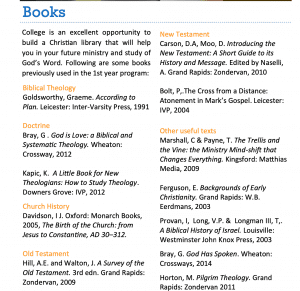FAQs
Looking for something specific? try our search
Does Moore offer part time study?
Only Year 1 of any of the undergraduate courses, including the DBT, may be studied part-time.
Part-time is less than 75% of the maximum study load (calculated by credit points for subjects) which involves one, two or a few subjects per semester.
Can I audit units at Moore?
Wives of current students may audit Year 1 units only and this is subject to conditions.
Current students may audit units, but this is subject to conditions and approval by the Learning & Teaching Committee.
Year 4 students may audit units not chosen as enrolled units.
Auditing is not available to members of the public or College graduates.
Can I do any courses online?
Only the Diploma of Biblical Theology and the Preliminary Theological Certificate courses can be done online.
How many days do I need to be on campus?
Unlike most universities, full-time students in Years 1 to 3 will be required to attend campus every day – Monday to Friday.
Students gather together over a cooked lunch, the cost of which is included in the fees.
Full-time students will need to attend lectures from 8am to lunch time most days.
Part-time students’ hours vary from 2 hours on one day of the week, to an intensive across one week of the year, to 6 hours of class across multiple days.
Thus, class hours will vary widely depending on the subjects chosen. Some subjects are heavier than others in terms of content and therefore have more contact hours.
How much do Moore courses cost?
See our Fees pages for a breakdown of tuition fees and census dates.
Students may only swap/enrol into units within the first three weeks of the semester but may unenroll from units until census day (30 April for semester 1 and 31 August for semester 2).
Is HECS-HELP / FEE-HELP available?
HECS–HELP is only available for domestic students studying at public universities. Moore College students can apply for FEE-HELP, which is a loan for eligible domestic fee-paying students:
- Most students can borrow up to $109,206 in their lifetime to pay tuition fees (this can vary in some fields of study). FEE-HELP does not cover any other costs.
- FEE-HELP attracts a 20% loan fee that the Government charges (e.g. if we charge $2000 for a unit, the Government will turn that into a $2000 debt for that subject). The loan fee itself doesn’t contribute to a student’s borrowing limit.
- Once an income of $47,014 is reached (thresholds may change annually), students are required to start paying the debt through the tax system.
- Repayments can be made on FEE-HELP loan to top-up the balance of their borrowing limit
- HECS and FEE-HELP loans are now combined, but if a student has used HECS-HELP before 2019, this HECS debt doesn’t count towards the borrowing limit under the combined loan scheme. HECS debts acquired from 2019 onwards will count towards the limit.
- Students can check their HELP balance through myGov > ATO Service
- Registrar’s Department can check how much of the FEE-HELP balance remains for students, but not any of the details
Students will be emailed an online form (e-CAF) after they enrol in subjects. See the Study Assist website for more information.
Is government financial assistance available?
Austudy provides financial help for full-time students aged 25 or over and studying an approved full-time course.
(Full–time here means at least 75% of the credit points of the maximum load for the whole year of study). See the Student Handbook for a list of units and their corresponding credit points to calculate study load.
Austudy is organised directly with Centrelink but Moore College supplies students with a Confirmation of Enrolment letter along with documents to clarify course start dates, residential requirements and entry requirements. See the Human Services website for more.
Students may be eligible for the Single Incoming Family Supplement but should check eligibility online.
Students may be eligible for Rent Assistance but should check eligibility online.
What accommodation does College offer?
Single students are generally accommodated in buildings right next door to the college. All meals during the week and weekend, except weekend lunches and Sunday dinners, are provided as part of the accommodation costs.
Married students are encouraged to apply for married housing as soon as their enrolment for the following year is confirmed. Married students are expected to live in college housing for at least 1 year of study under normal circumstances (exceptional circumstances should be raised during the admission interview).
Rental rates vary, according to the type of accommodation. No parking is available for students.
For more info, see our Student Accommodation page.
Can I study a stand alone subject?
Students must apply for a whole course of study, rather than stand-alone units outside of a course structure. There is an expectation that an applicant will work towards completing the whole course. The admission interview for our on-campus courses will involve discussion about an applicant’s ministry goals and course plans.
Can I apply for a scholarship?
Yes, information on scholarships, including information about applying for scholarships, are available via the Scholarships page.
What should I expect on an Open Night?
- Dinner
- Campus Tours
- Information Session
- Supper
During the information session, hear from Moore College faculty and students to learn about college life and how we prepare our students for ministry. After the session, stay for supper and engage with staff, students, and faculty at information stalls covering accommodation, admissions, academic support, fees, scholarships, courses, MooreWomen, and student ministry placements.
What should I expect in the Open Week?
During Open Week, you’ll attend sessions alongside a first-year student and have the chance to interact with our student body throughout the day. If you’ve registered for a consultation session, you can discuss your future plans with a faculty member and a staff member, addressing any questions about accommodation, admissions, fees, courses. After your activities, feel free to explore the campus or request a tour from the college member accompanying you.
See upcoming open Events here.
Can I study the book of Acts?
Yes, we have a PTC unit called Acts (NT2):
 Core Unit. Acts (New Testament 2) illustrates how the spread of the gospel in the early decades of the church was directed by the risen Christ. In particular, this unit shows how the spread of the gospel fulfilled the Old Testament expectations about God’s blessing the whole world through his people the Jews. Particular attention is paid to how the ministries of Peter and Paul took God’s plan to bless all people to a new stage.
Core Unit. Acts (New Testament 2) illustrates how the spread of the gospel in the early decades of the church was directed by the risen Christ. In particular, this unit shows how the spread of the gospel fulfilled the Old Testament expectations about God’s blessing the whole world through his people the Jews. Particular attention is paid to how the ministries of Peter and Paul took God’s plan to bless all people to a new stage.
Can I study apologetics?
Yes, we have a PTC unit called Apologetics:
 Elective Unit. Apologetics is written with the conviction that apologetics is more than just intellectual and philosophical debate. Apologetics involves people’s whole beings. Modern apologists need to be concerned with how people feel toward Christ and the gospel as well as how they think about Christ and the gospel. As a result the unit provides outlines of standard apologetic arguments along with practical help guidance on the correct attitude and behaviour that must accompany those arguments.
Elective Unit. Apologetics is written with the conviction that apologetics is more than just intellectual and philosophical debate. Apologetics involves people’s whole beings. Modern apologists need to be concerned with how people feel toward Christ and the gospel as well as how they think about Christ and the gospel. As a result the unit provides outlines of standard apologetic arguments along with practical help guidance on the correct attitude and behaviour that must accompany those arguments.
Can I study the writings of the Apostles?
Yes, we have PTC units called Pauline Letters (NT3) and Apostolic Writings (NT4):
 Core Unit. The Pauline Letters (New Testament 3) collects together Paul’s letters (except Romans) and introduces students to the distinctive language, theology and style of the apostle to the Gentiles. It covers the wide range of theological issues found in Paul’s work such as ethical guidance about proper Christian conduct, teaching on church leadership and governance, theological reflections on the nature of Christ and the expositions of the relationship of Law and grace.
Core Unit. The Pauline Letters (New Testament 3) collects together Paul’s letters (except Romans) and introduces students to the distinctive language, theology and style of the apostle to the Gentiles. It covers the wide range of theological issues found in Paul’s work such as ethical guidance about proper Christian conduct, teaching on church leadership and governance, theological reflections on the nature of Christ and the expositions of the relationship of Law and grace.
 Elective Unit. Apostolic Writings (New Testament 4) provides an overview of the non-Pauline letters. It introduces students to the wide range of literary styles and theological concerns found in these letters, such as the Christian attitude to suffering, the relationship of Christ’s sacrificial work to the Old Testament Law and the Christian expectation of the ‘end times’. Special attention is given to Hebrews, Revelation and 1 Peter.
Elective Unit. Apostolic Writings (New Testament 4) provides an overview of the non-Pauline letters. It introduces students to the wide range of literary styles and theological concerns found in these letters, such as the Christian attitude to suffering, the relationship of Christ’s sacrificial work to the Old Testament Law and the Christian expectation of the ‘end times’. Special attention is given to Hebrews, Revelation and 1 Peter.
Can I study Christian doctrine?
Yes, we have 3 PTC units called Knowledge of God (Doctrine 1), Christ & His Work (Doctrine 2) and The Church (Doctrine 3):
 Knowledge of God (Doctrine 1) focuses on what we can know about God based on what he has revealed of himself to us in Scripture. An important part of this unit is examining the nature and authority of Scripture itself, in which the concept of covenant is central. In addition to examining God’s sovereignty, power and Trinitarian nature, the unit also looks at the ideas of repentance, salvation and judgement.
Knowledge of God (Doctrine 1) focuses on what we can know about God based on what he has revealed of himself to us in Scripture. An important part of this unit is examining the nature and authority of Scripture itself, in which the concept of covenant is central. In addition to examining God’s sovereignty, power and Trinitarian nature, the unit also looks at the ideas of repentance, salvation and judgement.
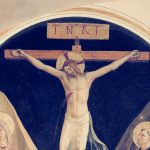 Core Unit. Christ and His Work (Doctrine 2) focuses on what we know about the identity of Christ and what he accomplished, especially on the cross. This includes introducing students to theological approaches to understanding how Christ’s humanity relates to his divinity. Understanding this is important for understanding what Christ did in his death and resurrection. Included in the investigation of the cross is an examination of the nature and effects of sin.
Core Unit. Christ and His Work (Doctrine 2) focuses on what we know about the identity of Christ and what he accomplished, especially on the cross. This includes introducing students to theological approaches to understanding how Christ’s humanity relates to his divinity. Understanding this is important for understanding what Christ did in his death and resurrection. Included in the investigation of the cross is an examination of the nature and effects of sin.
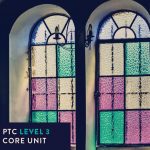 Core Unit. The Church (Doctrine 3) focuses on the doctrine of the Church along with some aspects of worship. The overarching theme is the place of the church in the purposes of God. This leads to discussions of both the fundamental nature of the church along with discussions of fellowship in the church and the continuity of the church. The aspects of worship of particular relevance to these discussions are the Lord’s Supper and Baptism.
Core Unit. The Church (Doctrine 3) focuses on the doctrine of the Church along with some aspects of worship. The overarching theme is the place of the church in the purposes of God. This leads to discussions of both the fundamental nature of the church along with discussions of fellowship in the church and the continuity of the church. The aspects of worship of particular relevance to these discussions are the Lord’s Supper and Baptism.
Can I study Christian ethics?
Yes, we have a PTC unit called Christian Ethics:
 Elective Unit. Christian Ethics explores the foundations of Christian ethics, taking as its foundation the grace found in the gospel and extending from there to consider the status of moral rules in general, the importance of motivation and the role of conscience in ethical decision-making. The course address both the positive and negative aspects of Christian ethics and once a solid theoretical foundation has been laid examines some contemporary ethical issues from a Christian standpoint.
Elective Unit. Christian Ethics explores the foundations of Christian ethics, taking as its foundation the grace found in the gospel and extending from there to consider the status of moral rules in general, the importance of motivation and the role of conscience in ethical decision-making. The course address both the positive and negative aspects of Christian ethics and once a solid theoretical foundation has been laid examines some contemporary ethical issues from a Christian standpoint.
Can I study Christian worship?
Yes, we have a PTC unit called Christian Worship:
 Elective Unit. Christian Worship explores how we can best worship God with a particular emphasis on how we should think about what happens when we gather together in worship. We begin by tracing the origins of worship through the Old Testament sacrificial system, moving on to consider the changes brought to worship by the gospel. With this groundwork laid the subject considers topics such as the use of music and liturgy in public worship gatherings.
Elective Unit. Christian Worship explores how we can best worship God with a particular emphasis on how we should think about what happens when we gather together in worship. We begin by tracing the origins of worship through the Old Testament sacrificial system, moving on to consider the changes brought to worship by the gospel. With this groundwork laid the subject considers topics such as the use of music and liturgy in public worship gatherings.
Can I study the book of Ephesians?
Yes, we have a PTC unit called Ephesians:
 Ephesians systematically works through Paul’s letter to the Ephesians, showing that God’s intention is to unify all things in Christ. While we wait for this intention to be completely fulfilled, God has already provided a living demonstration of this unity in the church, in which the fundamental distinction between Jew and Gentile has now been overcome. The unit unpacks the implications of this unity for individuals, the church and the whole creation.
Ephesians systematically works through Paul’s letter to the Ephesians, showing that God’s intention is to unify all things in Christ. While we wait for this intention to be completely fulfilled, God has already provided a living demonstration of this unity in the church, in which the fundamental distinction between Jew and Gentile has now been overcome. The unit unpacks the implications of this unity for individuals, the church and the whole creation.
Can I study church history?
Yes, we have a PTC units called Early Church History and Reformation Church History:
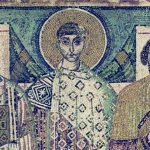 Core Unit. Early Church History covers the history of the church through its first five centuries, introducing students to the theological debates that ultimately led to the formal statements of Christian faith contained in the great creeds. This period also displays the many practical challenges the church faced as a minority population in a context that often presented Christians with a choice between holding to their faith and death.
Core Unit. Early Church History covers the history of the church through its first five centuries, introducing students to the theological debates that ultimately led to the formal statements of Christian faith contained in the great creeds. This period also displays the many practical challenges the church faced as a minority population in a context that often presented Christians with a choice between holding to their faith and death.
 Core Unit. Reformation Church History covers the history of the church during the period of the reformation. It introduces students to the late medieval religious context from which the reformation grew and draws attention to the theological importance of the reformation led by Martin Luther. It also covers the Catholic response to the reformation along with the connection between political and theological reform, especially in Switzerland and Tudor England.
Core Unit. Reformation Church History covers the history of the church during the period of the reformation. It introduces students to the late medieval religious context from which the reformation grew and draws attention to the theological importance of the reformation led by Martin Luther. It also covers the Catholic response to the reformation along with the connection between political and theological reform, especially in Switzerland and Tudor England.
Can I study the prophets?
Yes, we have 2 PTC unit called Former Prophets (OT2) and Latter Prophets (OT3):
 Core Unit. In the Former Prophets (Old Testament 2) we examine the experience of Israel from original conquest of the land to her eventual exile, as recounted in the books of Joshua, Judges, 1 & 2 Samuel and 1 & 2 Kings. This period provides us with a glimpse of what it means for God’s people to live securely in God’s place, guided by his king and prophets and so informs how we understand the Kingdom of God and the New Testament promise of an eternal inheritance.
Core Unit. In the Former Prophets (Old Testament 2) we examine the experience of Israel from original conquest of the land to her eventual exile, as recounted in the books of Joshua, Judges, 1 & 2 Samuel and 1 & 2 Kings. This period provides us with a glimpse of what it means for God’s people to live securely in God’s place, guided by his king and prophets and so informs how we understand the Kingdom of God and the New Testament promise of an eternal inheritance.
 Core Unit. The Latter Prophets (Old Testament 3) introduces the ‘writing’ prophets God sent to Israel leading up to, during and after the exiles that Israel experienced. In the Latter Prophets students encounter a wide range of topics and literary styles. Prominent in this material are warnings about coming judgement and promises of future redemption and blessing, although a special emphasis is placed on the promise of a new covenant that finds its fulfilment in the gospel.
Core Unit. The Latter Prophets (Old Testament 3) introduces the ‘writing’ prophets God sent to Israel leading up to, during and after the exiles that Israel experienced. In the Latter Prophets students encounter a wide range of topics and literary styles. Prominent in this material are warnings about coming judgement and promises of future redemption and blessing, although a special emphasis is placed on the promise of a new covenant that finds its fulfilment in the gospel.
Can I study how the Bible fits together (biblical theology)?
Yes, we have 2 PTC units called Introduction to the Bible (BT1) and Promise to Fulfilment (BT2):
 Introduction to the Bible shows how the great themes of the Bible fit together into one story that spans both the Old and New Testaments. At the centre of the story is of course Jesus and this unit shows how God planned to redeem his people, which begins with promises to Abraham and continues through the fortunes of the nation of Israel, reaches its climax at the cross.
Introduction to the Bible shows how the great themes of the Bible fit together into one story that spans both the Old and New Testaments. At the centre of the story is of course Jesus and this unit shows how God planned to redeem his people, which begins with promises to Abraham and continues through the fortunes of the nation of Israel, reaches its climax at the cross.
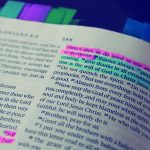 Promise to Fulfilment focuses on training students in a method for reading the Bible well, paying particular attention to interpreting each passage of the Bible in light of its place in the single overarching story that binds the Bible together as a whole. The passages chosen for particular attention represent a range of different genres and each come at a key stage in God’s unfolding plan of redemption.
Promise to Fulfilment focuses on training students in a method for reading the Bible well, paying particular attention to interpreting each passage of the Bible in light of its place in the single overarching story that binds the Bible together as a whole. The passages chosen for particular attention represent a range of different genres and each come at a key stage in God’s unfolding plan of redemption.
Can I study the gospels?
Yes, we have PTC units called Mark and John:
 Mark (New Testament 1) takes a systematic approach to reading through the Gospel of Mark, in the process answering the two central questions that Mark poses to his readers: ‘Who is Jesus?’ and ‘What did Jesus come to do?’. Attention is paid to locating the identity and work of Jesus in the context of the Old Testament expectations of the Messiah and showing how Jesus fulfils those expectations.
Mark (New Testament 1) takes a systematic approach to reading through the Gospel of Mark, in the process answering the two central questions that Mark poses to his readers: ‘Who is Jesus?’ and ‘What did Jesus come to do?’. Attention is paid to locating the identity and work of Jesus in the context of the Old Testament expectations of the Messiah and showing how Jesus fulfils those expectations.
 Elective Unit. This unit focuses solely on John’s Gospel examining its distinctive content and style. Through a close reading of the text, the distinctive features of John that are drawn out include the concepts of ‘life’ and ‘discipleship’. Specifically, what does it mean to ‘live’ or ‘abide’ in Jesus, and what does being a disciple of Jesus actually require?
Elective Unit. This unit focuses solely on John’s Gospel examining its distinctive content and style. Through a close reading of the text, the distinctive features of John that are drawn out include the concepts of ‘life’ and ‘discipleship’. Specifically, what does it mean to ‘live’ or ‘abide’ in Jesus, and what does being a disciple of Jesus actually require?
Can I study the Old Testament law and wisdom?
Yes, we have 2 PTC units called Pentateuch (OT1) and Wisdom & Exile (OT4):
 Pentateuch (Old Testament 1) covers the first five books of the Old Testament, examining some of the foundational events in the Bible such as creation, the fall, the promises to Abraham, exodus from Egypt and the giving of the Law. The great themes of sin, covenant, redemption, sacrifice and blessing all emerge from this unit which show how these point forward to the work of Christ.
Pentateuch (Old Testament 1) covers the first five books of the Old Testament, examining some of the foundational events in the Bible such as creation, the fall, the promises to Abraham, exodus from Egypt and the giving of the Law. The great themes of sin, covenant, redemption, sacrifice and blessing all emerge from this unit which show how these point forward to the work of Christ.
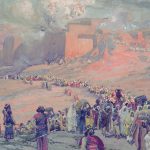 Elective Unit. Wisdom and Exile (Old Testament 4) focuses on those sections of the Old Testament devoted to the perennial questions and concerns of God’s people at any time. This includes books devoted to living well in God’s world (the Hebrew concept of ‘wisdom’), liturgical literature that helps us see how to bring our whole lives, both joyous and painful, before God and finally the Old Testament works that explicitly look forward to the ‘end times’.
Elective Unit. Wisdom and Exile (Old Testament 4) focuses on those sections of the Old Testament devoted to the perennial questions and concerns of God’s people at any time. This includes books devoted to living well in God’s world (the Hebrew concept of ‘wisdom’), liturgical literature that helps us see how to bring our whole lives, both joyous and painful, before God and finally the Old Testament works that explicitly look forward to the ‘end times’.
Can I study the Anglican Prayer Book?
Yes, we have a PTC unit called Prayer Book:
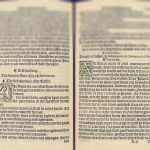 Elective Unit. Prayer Book explores the liturgy of the Anglican churches, and especially the role of the Prayer Book in providing a structure for that liturgy. The unit has an historical aspect, tracing the development of the Prayer Book from the pre-Reformation form to its contemporary form and noting the political and cultural forces that informed this development. It also has a theological aspect, using theological concepts to explain why the Prayer Book has the precise form it does.
Elective Unit. Prayer Book explores the liturgy of the Anglican churches, and especially the role of the Prayer Book in providing a structure for that liturgy. The unit has an historical aspect, tracing the development of the Prayer Book from the pre-Reformation form to its contemporary form and noting the political and cultural forces that informed this development. It also has a theological aspect, using theological concepts to explain why the Prayer Book has the precise form it does.
Can I study the book of Romans?
Yes, we have a PTC unit called Romans:
 Elective Unit. This unit examines Paul’s most important theological work, his letter to the Romans. Students will be introduced to Paul’s thinking on the concepts of sin, grace, law, judgement, predestination, salvation and blessing. Students are also introduced to another important central concern in Romans, that is the ongoing place of the Jews in God’s plans.
Elective Unit. This unit examines Paul’s most important theological work, his letter to the Romans. Students will be introduced to Paul’s thinking on the concepts of sin, grace, law, judgement, predestination, salvation and blessing. Students are also introduced to another important central concern in Romans, that is the ongoing place of the Jews in God’s plans.
Can I get a copy of my academic transcript or testamur?
Your academic transcript is an official record of all studies undertaken at Moore Theological College. Your transcript includes all units of study attempted, the marks achieved, and completion details (if applicable). Moore College provides you with a free copy of your academic transcript when you graduate from your course. You can request additional academic transcripts by completing the online form below or by downloading the Application for Official Academic Transcript form and returning it to the Registrar’s Department by mail or in person. Charges apply.
A testamur is the legal certification you received at Graduation showing that you completed a specific course. It does not list individual units or their results. You can request a replacement testamur if your original is lost, destroyed or damaged. You will need to include a Statutory Declaration if your testamur has been lost or destroyed. Damaged testamurs must be returned. You can request a replacement testamur by completing the online form below (for lost or destroyed testamurs only) or by downloading the Application for Replacement Testamur form and returning it to the Registrar’s Department by mail or in person. Charges apply.
What should I expect on Open Day?
During the information session you will hear from faculty and students of Moore College and will be able to find out what College life is like and how we equip our students for ministry. There will also be a Q&A opportunity with faculty and students.
After the session, please stay around for lunch and join in our Spring Carnival. It is a chance to chat to staff, students and faculty. We will have our Registrar’s department and Student Recruitment Officers available to answer questions about accommodation, admissions, academic support, fees, scholarships, courses, MooreWomen and student ministry placements.
What if I am not ready to start studying full-time next year yet. How can I prepare now to maximise my study & experience later?
What's the difference between a Bible college and a theological college?
In Australia, a Bible College has traditionally helped people to understand the Bible by teaching through the books of the Bible. A Theological College has traditionally included much more detailed study (languages, discourse analysis, etc.) of the text and training in thinking theologically – how to put the whole Bible together and think through the shape of ministry in line with that. The course at a theological college is usually designed (carefully and intentionally) to equip people for a full-time teaching ministry, giving them all they can to prepare people for that, while the course at a Bible College is more designed (just as carefully and intentionally) to help all Christians know their Bible better. That distinction has become a little blurred over the past few decades as Bible colleges moved into offering degree programs, which until recently had very largely been something only theological colleges did.
How does the College support and train students to be faithful to a gospel focused proclamation of God's word in a post modern world?
We seek to understand the world into which we are speaking the gospel. It is important that we know the word of God and how to communicate that in the world as it has always been but also as it is at this moment. Moore College, unlike many other places, includes in its curriculum specific courses on philosophy which, as well as helping us think, speak and write clearly and logically, also explores the ideas (including postmodernism) which have shaped the world we live and serve in. Actually at the moment, in many places we are living in a post-postmodern world.
How important is it to consider the denomination of the College and is there any major impact on future ministry (apart from if considering being ordained as a minister)?
The denominational foundation of a college will tell you where its basic theological and ministry commitments lie. You will want to study at a college which reflects a denomination or group within a denomination which is consciously and consistently trying to direct its life together according to the Bible. Reformational Anglicanism (the Anglicanism of Thomas Cranmer, etc.) saw that the Bible was the word of God, which the Spirit brings to our minds and hearts as we hear it read and preached. That, Cranmer and his friends were convinced, is how God changes people and indeed whole communities. So hearing the Bible read and hearing it preached (understood as two distinct and yet related things) are both critical for Sydney Anglicans and they are for this College as well. Other denominations might put the sacraments (or one of them) more in the centre of their life together, others might put a particular confession more at the centre, others might put a particular form of church government or ministry style and experience at the centre.
What are the strengths and weaknesses of Moore being an Anglican college as opposed to other multi-denominational options?
As an evangelical Anglican college, Moore College helps you to learn to navigate biblical faithfulness in the context of large denomination that is mixed in character (and the lessons are transferable to other denominations and associations of churches too). An interdenominational college, by its very nature, cannot really do that. Anglicans, particularly those who align themselves more closely with the Reformation roots of Anglicanism, are committed to the Bible as the word of God which changes and shapes life and directs the practice of Christian discipleship and ministry. So our Anglican heritage, while something we cherish and are keen to protect, is not our fundamental point of reference. The Bible’s teaching has that place.
Much ink has been spilled on the topic of overbearing leadership of ministers in recent times. How is Moore College serving the next generation of ministers to help them avoid heading that direction in their ministry?
We are deeply concerned with forming the character and behaviour of Christian leaders and directly address this issue at various times and in different ways: inside the classroom (particularly in 1st and 4th year), as well as outside (in chapel, in pastoral care groups, and one-to-one); by positively advocating humility and service, and negatively by exploring the theological imperatives and dangers of the behaviour. Our pastoral care program as well as our ministry and mission curriculum seek to grow self-awareness in students, helping them to individually identify their weaknesses and temptations, and how to work against these. The resilience orientation training also helps with this — and the optional resilience workshops — as they deal with how we respond under stress. Many 2nd and 3rd year students elect to do the ‘Intentional Ministry Reflection’ courses, which create opportunities for students to reflect on specific ‘problems/issues’ they’ve faced in a ministry or family situation, and learn more about what was going on for them and others as well as exploring how they could approach the scenario differently in the future. More generally, the cross-cultural orientation of ministry classes are an important part of formation of servant leaders. Humility is a big part of not being overbearing in leadership and that is a significant part about being able to see and understand issues from other people’s perspectives. These are key values that are built into the ministry and mission program. If in the course of their study we become concerned about the behaviour of a particular student, we will address this, including referring to a professional counsellor. We also provide a ‘Safe Ministry’ program across the four years of college, run by the Anglican Diocese of Sydney’s Safe Ministry team. We continue to re-evaluate and improve our curriculum and pastoral care program.
Is there a reason that Moore is not a member of ACT?
Moore College has a very long association with the ACT and still has. The Principal is a member of the ACT’s governing body, as are a number of other members of the faculty. However, in the 1990’s Moore College grew to a size and maturity that made it appropriate to seek the accreditation of its courses in its own right rather than as a member of a consortium of theological and Bible colleges. This has given Moore College greater freedom to construct our programs in the way we are convinced is better for our students.
Does the College function as your church for residential students or does pastoral care and mutual encouragement primarily happen in a local church outside the college?
College isn’t meant to function as your church. It is a community and offers pastoral care, mutual encouragement and edification. However students are expected to join a local church in Sydney. In some cases, this means being a student minister in a church and learning practical skills under a ministry team.
Regarding the faculty, what is theological range? What are the non-negotiable theological commitments shared by all faculty members, and what are some of the areas in which there is a breadth of views/approaches?
All our faculty are evangelical and reformed by conviction. The authority of Scripture (its truthfulness, clarity, coherence as the word of the living God, which rules the life of the mind as well as every other aspect of Christian discipleship) and the centrality of the cross (it is only through the cross of Christ that we are saved as our sins are dealt with in their entirety and we are reconciled to God) are linchpins of our teaching. We have long believed as long as those foundations are in place, freedom can be given to expound biblical teaching without censure. In addition, we have published values (on our website) which present our agreed way of working together. The majority of our faculty are ordained Anglicans and have given assent to the 39 Articles, but we also have some members from a Presbyterian and Baptist background. Many faculty members initially trained at Moore College but undertook postgraduate study at a range of institutions and so bring familiarity with a range of theological positions and approaches to the faculty. With considerable diversity of background and experience, there is a remarkable unity of theological conviction among the faculty.
How has the course structure changed over the past few years and are there plans for it to develop going forward, if so, how?
The College course is continually being refined and improved. In the past few years a major review was undertaken to ensure that the workload expected of students and faculty had not incrementally increased to the point at which it was unreasonable. In recent years, major revision in the area of training in public Bible teaching (especially preaching) has been undertaken. Just at the moment a curriculum review group is undertaking the latest of our periodic reviews of the program as a whole.
How much biblical or theological knowledge or experience do you need to enrol in a course?
We have a range of courses, from those that cater for those with no knowledge of the Bible or theology (e.g. our PTC course and our Diploma of Biblical Theology) to our PhD courses which require you to have an undergraduate theology degree with at least one biblical language. Our main courses for the training of full-time gospel workers (our BD and BTh) have no formal prior learning requirement and our first year students enter with a variety of different levels of understanding.
Do you have standard advice for fundraising, or is that left with the students?
You can find some standard information and support options for living and studying at college:
I have heard that Moore College is great at supporting and equipping men who want to become Anglican ministers, which is great. But how well set up is Moore College to support and equip men and women who do not fit that mould?
Our students come from a wide range of backgrounds and go out from college to just as wide a range of ministry opportunities. Our conviction is that whatever church you end up working in, or if you work on a school or university campus, or if you travel overseas to do cross-cultural gospel ministry, you need the same basic equipment of a deep and broad knowledge of the Bible and ability to think theologically on the basis of its teaching, an understanding of our Christian heritage and of the world in which we serve, and skills in communicating biblical truth and mentoring/caring for others. That conviction means there is really no mould you have to fit in order to get the most out of College, apart from being someone who wants to teach the Bible in whatever setting God places you in order to play your part in taking the gospel to the world.
Do any of the yearly mission teams go overseas?
Each year, Moore College sends teams of students and faculty out from College to partner with churches to run missions that proclaim Jesus. From local areas to remote Australian towns, and further around the globe, our teams work hard at spreading the word of God to all corners of the world. In 2019 mission took our students to Asia, Africa and around Australia. You can read more about what our teams got up to last year here or during the Mission re-imagined (COVID-19 edition).
What % of full-time students have a part-time job while they study?
A very small %, as we recommend full time students give considerable time to study. However it will depend on circumstances, and you would talk with our Dean of Students (Paul Grimmond) or your chaplain in order to talk through what is best for you.
What is the time commitment when living in college (both study and 'expected' social)? How easy/hard is it to maintain relationships outside the college bubble?
Part-timers study in different capacities, whether totally online (PTC and DBT), in the evenings in Newtown, or during the day in Newtown. Which mode of study you choose will determine what kind of opportunities you have for direct contact with other members of the Moore College Community. Hence, there are varying levels of genuine fellowship for each of these modes of learning. The DBT has tutors and fosters relationships between students through forums and other online platforms. The evening class students have a supper break to get to know each other, and are usually a smaller class, so get to know each other quite well (especially across a few years). The day-time part-time students are invited to join chapel (3 days a week), morning tea, lunch, a chaplaincy group, and a prayer group, depending on which day/s they are around, as well as any other community activities. There is also a Director of Part-Time Studies, Chris Conyers, who is a point-of-contact for all part-time students, as well as someone who listens out for the needs of part-time students. He runs an orientation session to help part-timers as they settle into College study and community.
In what ways are spouses who aren't studying at College supported?
There are community dinners that usually happen once a week during summer, community chapel (once per term), Moorewomen (this includes bible studies, talks and Junior Jivers). For men spouses there are informal suppers that happen once per semester.
What things should I not expect about College? (going after the fairy tale images / unrealistic expectations people sometimes have of college)
- College isn’t perfect, no college is; faculty aren’t perfect, our teaching methods are not perfect, nor our marking, nor our pastoral care, nor our curriculum; fellow students aren’t perfect (they’re not always thoughtful in what they say or inclusive or thankful); our systems and admin isn’t perfect, neither our buildings or accommodation.
- Every student is different, in terms of their expectations, their preferences, what they love & what they find challenging, but also their experiences vary; but every student would be able to speak of something that frustrates them, or doesn’t live up to their expectation (although also other things they’re incredibly thankful for and appreciate).
- We talk a lot about the cohort of your year group and being life-long support to each other in vocational ministry, but this can put pressure on friendships; it takes time to build deeper fellowship with people, and often happens more organically, and may happen more after people have left College.
- We listen to our students and keep working at improving things.
- You can’t learn everything at College, so some will be disappointed by what they notice is missing.
What are the admission requirements?
Academic requirements
Diploma of Biblical Theology (DBT)
Completion of HSC (or overseas/interstate equivalents) or a Cert IV (or higher) level qualification. (You can see levels of qualifications here – they are Government-determined.)
Mature age students (21 and over) can be admitted via an entrance exam if they don’t meet the above academic requirements. The entrance exam is a 2-hour take home comprehension test involving listening and reading tasks. It is issued after someone submits their application. Entrance exams aren’t an option for overseas students.
Those who are overseas students need to have studied the HSC/Cert IV or higher qualification in English medium or have English as a first language. If these language requirements aren’t met but the academic requirements are, then applicants need an IELTS score of at least 6.5 in all categories of the test (or TOEFL equivalent). We can’t waive the rules for overseas students at all. Students on a student visa cannot study the DBT, as a visa allows them to come to Australia, but this is not needed as it’s a distance course.
Other Undergraduate Courses (Advanced Diploma, Bachelor of Theology, Bachelor of Divinity)
A prior degree from an Australian university or equivalent qualification.
Mature-age students (aged 21 and over) without a prior degree may apply on the basis of prior study and/or work and life experience. They will most likely be required to sit an entrance exam, but this will be confirmed by the admissions officer after applying. The entrance exam is a 2-hour take home comprehension test involving listening and reading tasks. It is issued after someone submits their application. Entrance exams are not for International students.
Those who are overseas students need to have a degree taught in English medium or have English as a first language. If the language requirements aren’t met but the academic requirements are, then applicants need an IELTS score of at least 7.0 in all categories of the test (or TOEFL equivalent). We can’t waive the requirements for overseas students at all.
Other requirements
- Completed application form (soon the electronic one linked to CRM will go live)
- Supply these with the application:
- Copy of birth certificate or passport
- Any academic transcripts
- Reference from the senior minister/pastor of applicant’s church
- For AdvDBMM, BD and BTh applicants, references from two other people (one male, one female) in a position of church leadership (not family members, current applicants or current Moore College students). [Not needed for DBT students]
- An interview with a lecturer or chaplain at the college. [not needed for DBT students]

